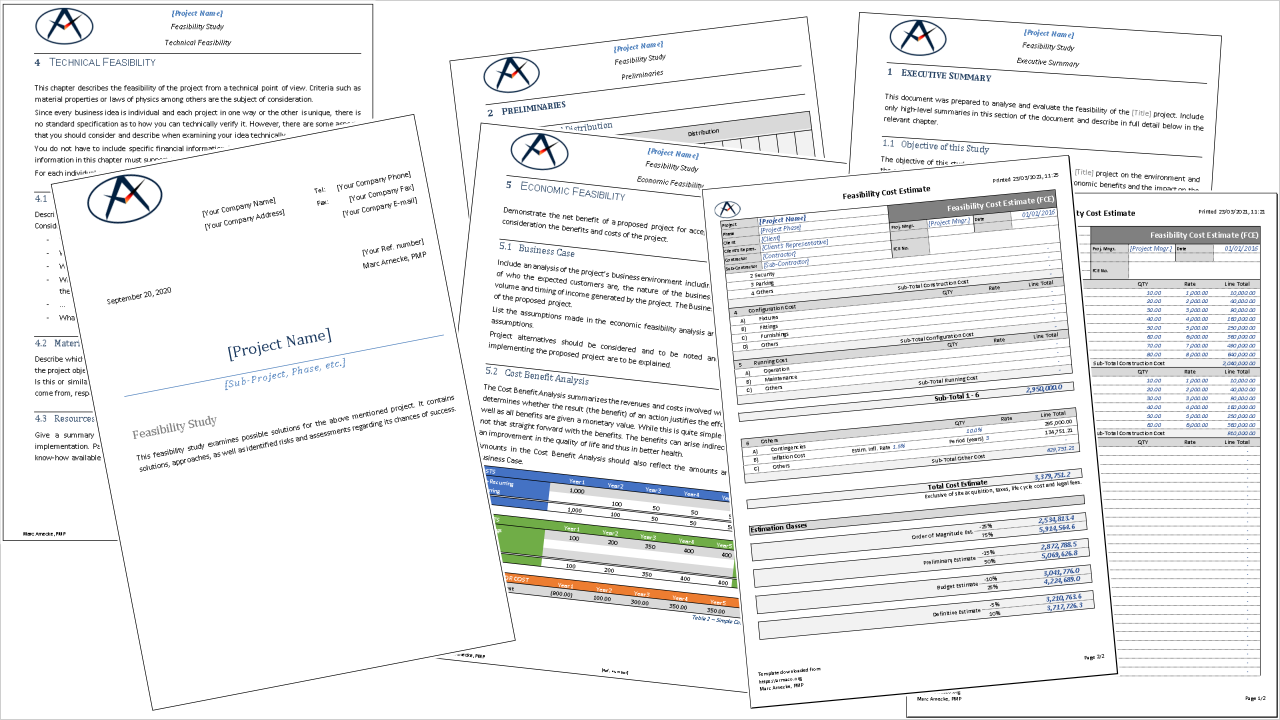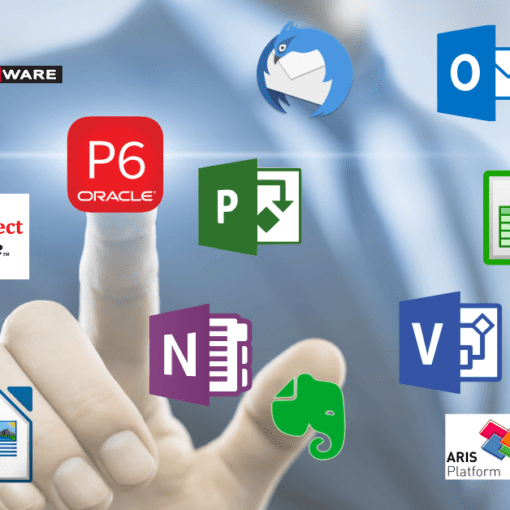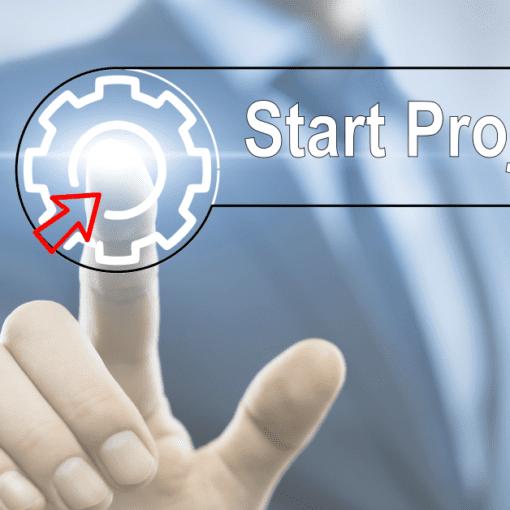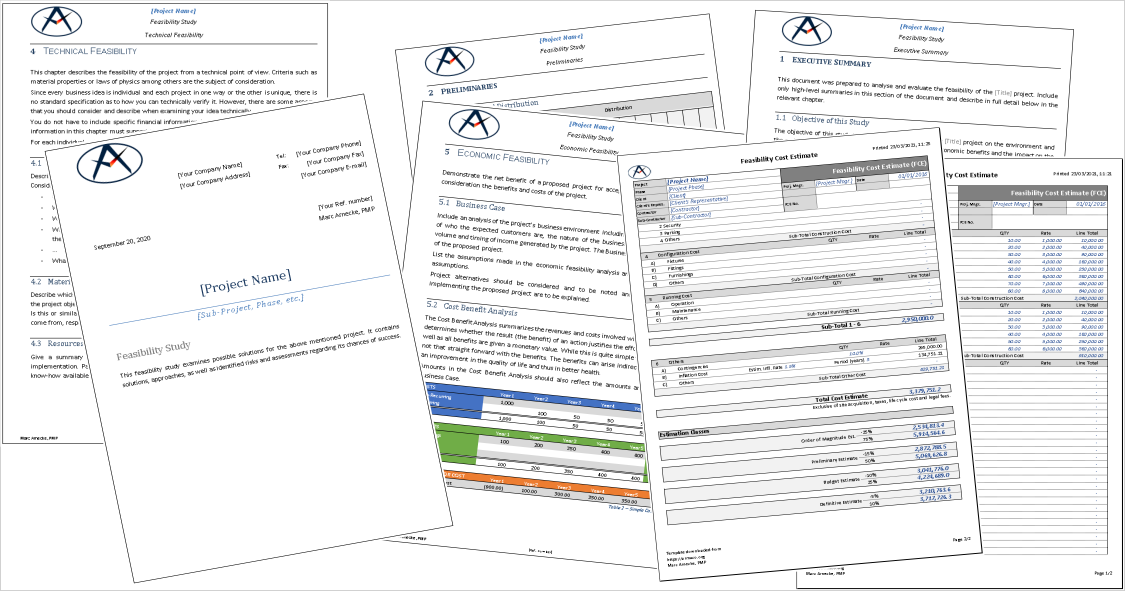A project feasibility study aims to enable a decision as to whether or not a project shall be implemented. The prerequisites for the study are clear project goals, as well as existing limitations concerning the acceptance of project risks, funding, and time, among others.
Who are these Feasibility Study Templates for?
The project management templates offered on this website, including this feasibility study, are suitable for students as well as for experienced project managers.
Why should you definitely download these feasibility study templates?
If you have a feasibility study to prepare, you have a large task on your list of things to do.
The templates offered on this website will help you in your task and save you a lot of time and work for a very small price.
Would you like some FREE project management sample templates?
Tell me where to send the download link
Your email address will not be passed on to third parties. It will only be used to send you a few samples today and in the next few days.
This Article about Project Feasibility Study covers the following Topics:
What is a project feasibility study in a nutshell?
The project feasibility study tests the compatibility of project goals with one another, against specifications, environmental, and other conditions. It makes particular sense for large projects, projects with high risks, and projects with lots of uncertainties.
The study comprises data that is particularly collected for the study and data that already exists within the organization.
To carry out the feasibility study, you need knowledge of the project goals or the target state for which the project is undertaken. In absence of this, the study is not possible due to a lack of research focus.
What are the Objectives of a Feasibility Study?
The study aims to decide whether the project shall be initiated and proceed to project planning. The study itself can often be treated as a preliminary project, the result of which is used to decide whether the project shall be carried out.
The feasibility study develops knowledge and helps to better understand the project from different perspectives.
The main objectives of the study usually are
- Avoidance of bad investments and resulting losses,
- Revealing different solutions to achieve the project goals,
- Identification of risk factors, which could cause the project to fail,
- Establishing of prerequisites,
- Evaluation of environmental factors,
- Detection of weaknesses.
In other words, the study among others will typically answer the following questions:
- Technical feasibility - "Is this project possible?"
- Legal feasibility - "Are we allowed to do that?"
- Operational feasibility - "Are we capable enough to do that?"
- Schedule feasibility - "Is it achievable in the given time and does the project still make sense by then?"
- Economical feasibility - "Is this project even worth it?"
As banal as it sounds, the main reason a feasibility study is conducted is to find an answer to the question "Should we or shouldn't we?"
What is the Content of a Feasibility Study?
Not every project initiation necessarily has to result in a project. On the contrary, the more project ideas are critically examined, the more likely projects will not be continued. This is based on the project environment and the limits set by top management. These may include, for example, strategic corporate goals, financial interests, prestige, or possible risk factors.
The preparation of a feasibility study makes sense for projects of all kinds and sizes, especially if the project develops a new product or process that never existed before, or if the project is executed in unknown territory with lots of uncertainties. This pre-evaluation of various subject areas depends on the effort and size, and can be considered a separate project in itself - a "preliminary project".
The completed feasibility study describes predictable results for the management and therefore serves as the basis of the decision-making process, pro or contra the project.
In many cases, the study reveals evident deficiencies and exclusion criteria that lead to a stop.
Reasons to stop could be, among others:
- Numerous risks associated with the project,
- Incompatibility of the project with the company's values or principles, or
- A negative response from intended users of the project product based on a survey.
What are the Types of Project Feasibility Study
To create a comprehensive feasibility study, the following areas must be considered:
- Technical Feasibility Study
The primary goal of a technical feasibility study is to determine the extent to which an idea can be implemented in practice and what technical approaches there are. - Legal Feasibility Study
As the name suggests, this study deals with legal considerations, and with permits and licensing issues. - Schedule Feasibility Study
This will take into account the amount of time the project requires for completion and whether the demand by then still exists. - Operational Feasibility Study
deals with the capabilities of the organization to carry out the project. The criteria here can be resources, authorities, responsibilities, and the project management maturity level of the organization. - Economic Feasibility Study
The economic feasibility study deals quite profanely with whether the whole thing is worthwhile. In the end, companies usually exist primarily to generate profits.
The different feasibility studies are usually interdependent.
If, for example, the resource-related feasibility reveals a lack of personnel that has to be hired, this can have an impact on the economic feasibility and the time frame.
If licenses are found to be missing in legal feasibility, or if there are legal gaps, closing them could again have economic and time impacts provided that they do not lead to the project being discontinued.
How to Conduct a Feasibility Study?
To carry out a feasibility study, a lot of data has to be collected and converted into information through evaluation and comparison. In data collection, a distinction can be made between primary and secondary data.
Primary data
Primary data and research is used as empirical method to collect new, previously unknown data. The advantage is the possibility to collect data that is specific to the problem and to be able to pull this into the project context using its own methodologies. In this way, special questions can be developed and tailored.
The main disadvantage can be derived from this. The survey costs time and money, as well as a basis of specialist knowledge to process complex problems and develop questions. Methods of primary data collection can be, for example:
- Interview/survey (by telephone, in writing, computer-aided, in-person) For example, interviews with residents in the construction project. Expert opinions or technical discussions are also part of this. Likewise, self-commissioned studies.
- Observations can be useful, especially when it comes to environmental factors, but can sometimes take years to describe flora/fauna on-site in a construction project. Who would have expected the chaos around the famous German project "Stuttgart 21" because of a beetle?
- Experiments, samples, simulations An experiment sounds like a laboratory, but you could, for example, do a market test as part of project management for a product launch, which represents an experiment. Otherwise, this also includes geotechnical investigations and others.
Secondary data
Secondary data and information already exists within the organization or with third parties and are available. Secondary research data, which, for example, could be purchased from third parties, in contrast to the primary survey, can be collected relatively promptly. The aim is to collect initial data, additional data, or data for comparison and validation.
In contrast to the primary survey, the advantages and disadvantages are reversed. The advantage of the existing data is that it is available quickly. Depending on the source, the data can be cheaper than an own survey. However, the validity of the data needs to be confirmed, and the data may be collected for a slightly different purpose. Secondary data can be collected, for example, via:
- Market research institutes,
- Interest groups, lobbies,
- Patents, reports,
- Publications, dissertations, magazines,
- Information broker, subject matter experts,
- Sales statistics, cost accounting, business reports, and other internal or publicly available records.
Estimation methods
Not every data snippet has to be collected as part of the project study. Values can also be estimated, for example using proven methods or empirical values. The knowledge that is already available in the organization can be used for reliable estimates.
The estimates in the run-up to the project can have a low level of detail and therefore their quality may be low. Before the project, often neither resources nor expenses can be usually described or calculated in great detail. The quantification of values, price fluctuations, and other necessary items can only be estimated within a certain more or less accurate range.
The methods briefly outlined in this article in combination are suitable to create a more or less accurate project overview. The goal at this point remains to enable decision-making on whether the project can be carried out within a certain framework.
This is not yet the detailed planning of the project!
Also read about how to write a project management plan. I am offering a comprehensive template set that will save you a lot of time and effort.
Download Feasibility Study Template Set
As described above, there are many things to consider and include when preparing a feasibility study. So that you don't overlook anything, you get a complete document, which already contains the complete structure of your feasibility. All you have to do is fill in the sections with relevant data from your project.
→ Click here to download the feasibility study templates now ←
2750+
Downloads
20
Years experience with large projects
?
Weekends you will spend re-inventing the wheel
60
Days money return
What do recent Buyers say about my Feasibility Study Templates?
Good
The structure of your plan is well-organized, making it easy to navigate and understand. It’s a testament to your expertise.
Best ever seen
Very good and very profitable
Good Template
Use the template for your business
Exactly what I needed
I have been using these for a couple of month now and I LOVE THEM. I was sent a couple of the forms by a friend, so this is me “ordering the complete set” for what I’ve got coming up next.
Cindy
I love your templates. Unfortunately, I’m not in the construction trade so a few of the included templates aren’t for me, but the rest are great and a huge time saver. You saved me many hours of work. In this respect, the price is more than justified.
Response from World of Project Management
Hello Cindy,
Thanks for your feedback!
I’m happy to hear that my templates have been of help to you, even though some are specific to the construction business.
All the best with your project!
Best regards,
Marc
60 Days Refund Policy
Please leave a comment below and contact me if you have questions, need help, or if you require customized project management templates.
Contact Marc
No related posts found






